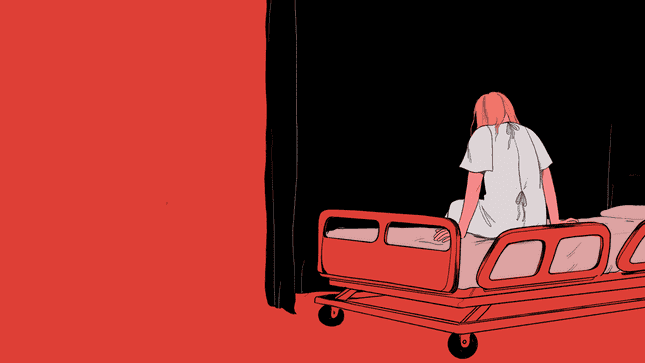After Nightmare Pregnancy Loss Under an Abortion Ban, Texas Woman Weighs Trying Again
Elizabeth Weller made headlines last year for bringing her foul discharge to the ER to prove an infection was killing her.
AbortionPolitics
Illustration: Vicky Leta
The public learned, in graphic detail, exactly how far the harms of abortion bans reach after the Supreme Court overturned Roe v. Wade last June. It seemed like every week, patients and doctors were coming forward to talk about women who developed life-threatening sepsis or filled diapers with blood before they were finally able to get abortions. Some never got that care, like a Louisiana woman who was forced to deliver her nonviable fetus, and cancer patients who had to delay their chemotherapy. Another woman’s fetus didn’t have a skull, and still she had to travel 1,400 miles to get an abortion. These stories dominated the headlines for months. Recently, we caught up with one of the women who shared hers.
Elizabeth Weller’s water broke at 18 weeks into her pregnancy, long before a baby could survive. It was May 2022 in Houston, Texas, where a six-week abortion ban was in effect. The Wellers wanted to end the pregnancy rather than have their baby suffer, but there was still a heartbeat. The hospital told Weller she basically had two options: wait for the fetus to die inside her, or wait to develop a life-threatening uterine infection from the lack of amniotic fluid. Only then could the hospital end the pregnancy under the law’s medical emergency exception.
As Weller waited at home, her health deteriorating, the hospital told her by phone she wasn’t sick enough yet. Then, when she had dark, foul-smelling discharge, she called her doctor, who told her to go to the ER right away. She felt so gaslit by the situation that she brought a piece of toilet paper with the discharge as evidence in case they didn’t believe her. She didn’t end up needing it, as the hospital ethics panel finally determined she could be induced. Weller decided to share her story on the record with NPR soon after.
Weller, 27, recently graduated with a masters in political science, and has been having hard conversations with her husband about their plans for children and for staying in the state. Here’s what she had to say.
This transcript has been lightly edited for length and clarity.
I remember sitting in my hospital bed thinking about how, the semester before this happened, I had taken a media class in politics. In that class, they told us that the literature has found that when conservatives see anonymous sources, they predominantly think, “Oh, this source was made up by the reporter.” I didn’t want that to happen. I didn’t want this to be another thing where something horribly tragic and very personal—and I think an issue that other women are going to have to face—would give people a reason to say, “This is a fake issue.”
-

-

-

-

-

-

-

-

-

-

-

-

-

-

-

-

-

-

-

-

-

-

-

-

-

-

-

-

-

-

-

-

-

-

-

-

-

-

-

-








































